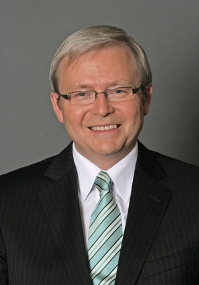Rudd appoints first national security CIO

Former Defence intelligence officer Rachel Noble has been appointed as Australia's first national security chief information officer (CIO) — a role that will provide strategic technology advice to Prime Minister Kevin Rudd.

Kevin Rudd
(Credit: Commonwealth Government)
Noble will move from her current position within the Defence Signals Directorate (DSD) to the Prime Minister and Cabinet's (PM&C) National Security and International Policy Group on Tuesday 14 April, Terry Moran, Secretary of PM&C confirmed in a statement to ZDNet.com.au.
"Rachel has a distinguished career in a broad range of senior Defence appointments spanning international policy, intelligence, operational support and governance," said Moran.
The position will report to former SAS commander Duncan Lewis, who was last December appointed as Rudd's national security advisor.
Noble will provide strategic direction and lead policy development and coordination within the national security community in relation to its information technology and communications (ICT) architecture, according to Moran.
John Geering, who was the acting head of Defence and Intelligence Policy Branch within the Office of National Security will also take up a new role as assistant secretary for Defence Policy within PM&C, "effective immediately", said Moran.
Geering has been heavily involved in the current Defence white paper due for release this year. Defence CIO, Greg Farr, told ZDNet.com.au in January that the white paper would for the first time incorporate the department's ICT within strategic recommendations.
"John has served in PM&C since early 2006 initially leading the Defence Capability Section. He has a career background in Defence intelligence and capability development and has been heavily involved in all aspects of defence policy advice to the Prime Minister," said Moran.
Protecting roaming officials?The appointments come amidst claims by The Australian that the Prime Minister's email and mobile phone was the target of cyber-spying during a trip to China last August.
Rudd acknowledged the threat that hackers posed to national security at his inaugural address on the matter last December. "A number of actors may carry out such attacks ranging from hackers, to commercial entities and foreign states," said Rudd.
Managing director of technical counter surveillance firm ESD Australia, Les Goldsmith, who claims some Australian officials use the cryptographic phones his company distributes locally, told ZDNet.com.au that the Sectera Wireless GSM Motorola "Time Port" encrypted mobile phones used by Australian government officials were "outdated" and are no longer in production.
"The traditional encrypted mobile phones that the Australian Government uses is a dual-band phone with a monochrome screen. That tells you how old it is," he said. "And they can't operate on multiple networks. They also have limited functionality, no email or any secure storage capabilities."
The US Government does offer its own officials encrypted PDAs with email; however, foreign governments, including Australia, are excluded from buying such devices, said Goldsmith.